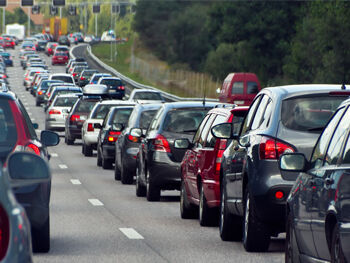University News Last updated 17 June 2019

Mayor of the West Midlands Andy Street is challenging tech innovators, artists, politicians, academics and business leaders to collaborate on innovative solutions to cut pollution.
The ‘Mayor’s Clean Growth Challenge’ will be launched on Clean Air Day (Thursday June 20) to find ways to tackle toxic pollution after the Mayor said the West Midlands has a “moral responsibility” to lead on clean growth.
The Mayor has set out four separate Clean Growth Challenges, centred around the creation of more low-carbon buildings, clean transport systems and a new approach to clean energy leadership in the region.
Mayor Andy Street said: “Clean growth is a challenge facing every major city across the globe.
“That’s why I’m throwing down the gauntlet to businesses, academics and political organisations across the region to get together to meet my Clean Growth Challenges. We can improve, enhance and innovate on the great work already underway in the West Midlands and show we have the big ideas to grow a strong economy without creating a cost for our environment.”
Day one of the Mayor’s Clean Growth Challenge will take place at the Birmingham City University’s Curzon Building, with a range of high-profile speakers tackling topics from low carbon transport and clean energy to the West Midlands’ ‘clean air revolution’.
The second day will be held at the STEAMhouse facility in Digbeth. STEAM events bring together a wide range of people with various specialisms to find new solutions to problems. The session will take a “two heads are better than one” approach to create pollution-busting ideas, and will include tech innovators, artists, academics and business leaders.
The event is being hosted by Birmingham City University and Eastside Projects’ STEAMhouse initiative, in partnership with West Midlands Combined Authority (WMCA) and Climate Change Solutions.
Key speakers at the event include world explorer Mark Wood, who has witnessed first-hand the impact of climate change on the north and south poles.
He will be joined by Birmingham City Council’s Councillor Lisa Trickett and Professor Julian Beer Deputy Vice-Chancellor at Birmingham City University.
Professor Julian Beer, Deputy Vice-Chancellor at Birmingham City University, said: “There’s no doubt that identifying solutions to the challenge of improved air quality is an urgent priority for all of us.
“I’m delighted that the Mayor of the West Midlands Andy Street has chosen to work with Birmingham City University and STEAMhouse on this element of his clean-green future agenda.
“It’s a recognition of the University’s leading position in innovative STEAM thinking - bringing together individuals and organisations from different backgrounds to maximise opportunities for creativity and innovation.”
Up to 900 people in Birmingham die early each year as a result of air pollution, and it has been linked to still births, premature deaths, heart disease, asthma and cancer in the city.
Air pollution is likely to affect people living in vulnerable and deprived areas the most, and children living in high pollution areas are four times more likely to have reduced lung function in adulthood.
During his mayoral campaign, Andy Street highlighted the need to make the West Midlands more sustainable and tackle pollution.
The Mayor has now set four Clean Growth Challenges for the region:
- Clean Energy Leadership Challenge
Consider ways to replace the £10 billion currently spent importing mainly carbon-based power, gas and transport fuel to save money and create new jobs. This could include generating greater public, private and community sector leadership to produce more clean energy.
- Low Carbon Buildings Challenge
Consider how to accelerate retro-fitting the built environment, including business and public sector buildings, homes, and particularly homes of people in fuel poverty, to create low-carbon, energy efficient buildings.
- Clean Transport Systems Challenge
Fossil fuel-based petrol and diesel transport is causing premature deaths with toxic pollution while damaging public health. Consider a shift to clean fuel technology for all transport, including cars, lorries, buses, trains and planes, with electric, hydrogen/fuel cells and hybrid alternatives.
- Behavioural Change Challenge
Consider how to change people’s behaviour to reduce pollution. This could include new ways to raise public awareness of atmospheric pollution, while showcasing a range of solutions and what people can do to make a difference.
Both days of the Mayor’s Clean Growth Challenge are free to attend, and people can register by visiting Eventbrite and searching for ‘STEAMhouse Mayoral Challenge’.